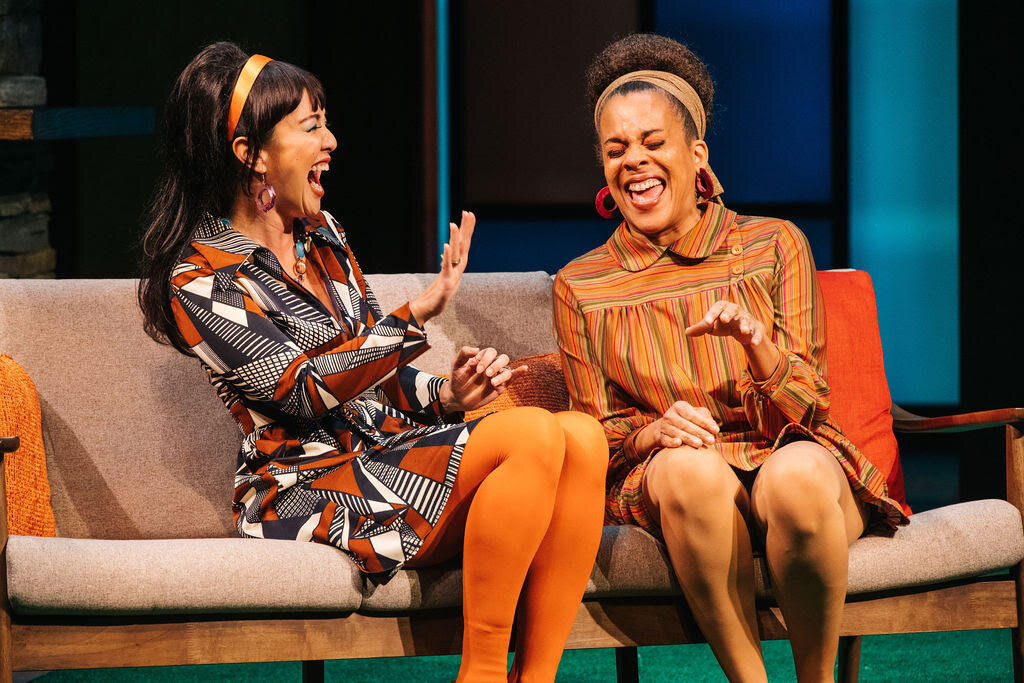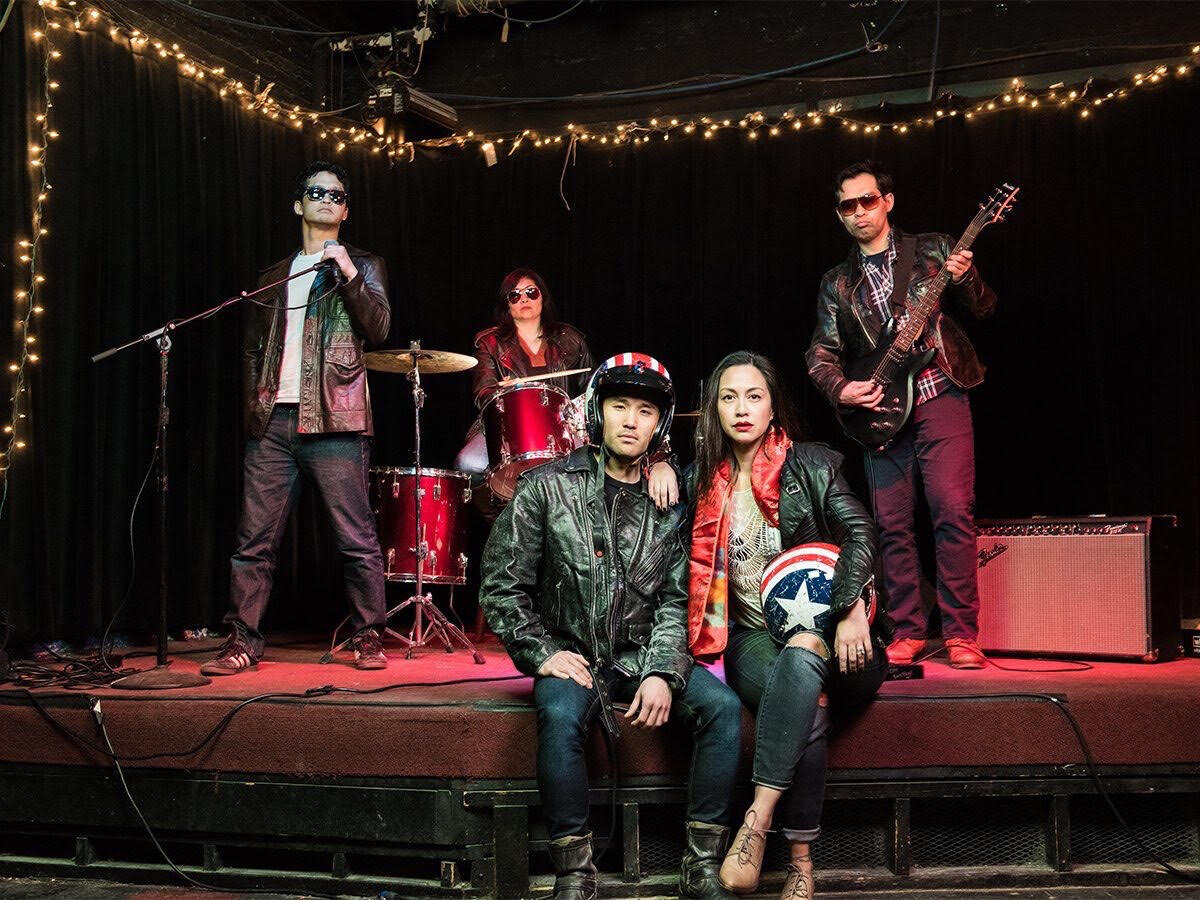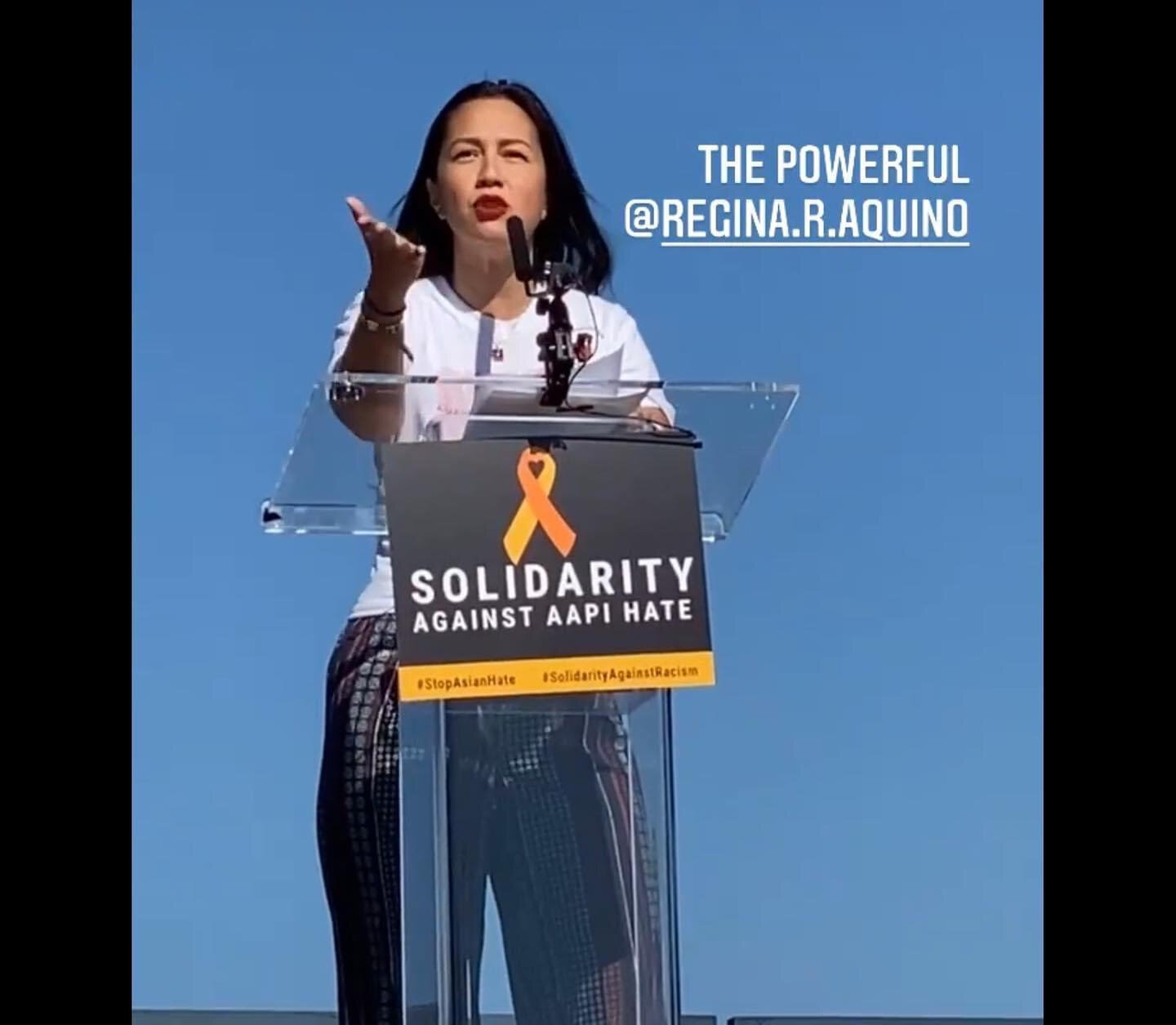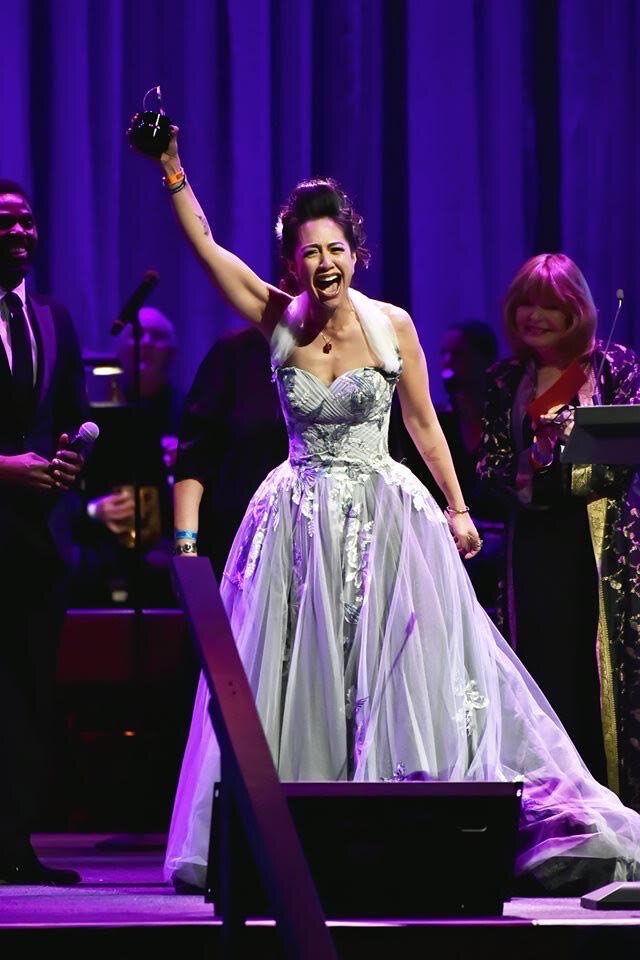Regina Aquino
Regina Aquino has never been one to pull her punches. As a Filipinx actor in America, she has developed a thick skin and a wry perspective on the machinations of American theatre — what it is, who it’s for, and who gets to decide what is “good.”
With a resume that includes Folger Theatre, Woolly Mammoth Theatre Company, the Studio Theatre and the Kennedy Center, Aquino has breathed fiery life into shows like Red Light Winter, Vietgone, Describe the Night and The Merry Wives of Windsor over the years.
When she stood onstage at the Helen Hayes awards in 2019, accepting the award for Outstanding Lead Actress in a Play for her work in The Events at Theater Alliance, she seized the moment as a call to action to combat gun violence, toxic masculinity and white supremacy.
Asked why she’s an artist/activist, she says, “That role was foisted upon me because every room I walk into is political. Every role I take is political to somebody. I don't wake up and think I'm a Filipino woman, but when I walk out my door, I'm very keenly aware of the fact that that's my identity, based on how people perceive me. So I chose to weaponize that. Because why am I going to let them weaponize who I am against myself?”
While Aquino has worked on Washington, DC area stages for years, the arrival of the pandemic in 2020 jerked her to a halt, just as it did for people in the performing arts worldwide. She’d just closed The Merry Wives of Windsor at Folger Theatre and found herself at loose ends for the rest of the season with nothing but … time. To think.
“We closed the week before the world closed. I was in the process of contract negotiation for the next season, and it was just, you know, ‘it's gonna be a couple of months. It's gonna be a couple of months.’ Sweet summer child, little did you know,” she laughs.
“I think back on it, and I have so many thoughts about the way that I was working, and what I was working for, and what I thought I was doing, and what was important to me, and what I was capable of, and who I was as an artist, and it's all just bullshit. I was doing five shows a year, and I'm like, ‘I'm living it, I’m an actor, and I'm just going to be an actor.’ And if you'd asked me if I would ever direct or if I'd ever write, I'm like, ‘No, I'm an actor. I'm not a director. I'm not a writer, I can't write shit.’ We put ourselves in these little boxes, because we're afraid.”
With the pandemic, politics, and a year of long-needed racial reckoning sparking around her, Aquino reevaluated why she worked the way she did, and whether she even needed to rely on writers and directors to create work for her.
“For someone like me, the amount of work that I have to put into being perceived as perfect and infallible and palatable, and yet, challenging … It was just this tightrope that I'm forced to walk just to get work. As an actor, the possibility of me being something more than that wasn't something I believed. And then something about this pandemic, where I was like, ‘You know what, I'm not the only person that's been siloed this way.’ And the more the more artists of color started talking about the inequities and the injustices that we suffered every day, it was like, ‘You know what, fuck this. I'm gonna do whatever the fuck it is that I want to do. And I'm not going to do it within the the constraints of the system anymore that wasn't built for me.
“Why am I looking at myself and asking, ‘How am I going to play Lady Macbeth?’ I don't give a fuck. Why do I want to be the best Filipino Lady Macbeth? I'd rather actually burn that whole fucking thing down. And that's not to say I don't love that play. But I don't want to be compared to every other white woman who's played that role. I don't want to be compared to every other woman of color who's played that role. I want to play that role as a human being. Will I be allowed to just do that? Will I be allowed to make mistakes? Am I allowed to have a bad show? Am I allowed to just be an American and not be political based on my skin color?”
article continued after photos




“I'm just tired of being polite,” she adds. “I'm in my prime, and I'm not going to have the energy to do this forever. So I'm gonna burn everything down while I have [the energy]. What we can build in the hopes that I'm around when we are able to build something new?”
Soon, Aquino found herself in a directing class, rethinking everything she’d internalized about whose stories are told, and who tells them.
“Our art has been commodified, which means we have been commodified,” she says. “I am a commodity. My body, my experience, my trauma, those are all things that people purchase when they hire me, when they buy a ticket to see me in a show. And that's a mindfuck, isn't it? But then you start recognizing — why am I using all of my stories and my ancestral trauma and all of my knowledge and beauty to tell someone else's shit? Why am I not telling my ancestral story?”
“I never thought that I had any right to tell my story,” she adds. “I didn't think that anyone would give a shit. That was a major crisis of identity in that moment. And then I realized, there are a lot of mediocre white men out there who have never asked themselves that question … Historically, there's only ever been one of me in a room. I'm used to being the only woman of color in a room. I'm certainly used to being the only Asian woman in a room. So that idea of, ‘Am I allowed to take up space with who I am, what I've spent my whole life minimizing, who I actually am?’ That took a lot.”
After beginning work on telling her own story, she also found herself with the opportunity to direct Susan Soon He Stanton’s we, the invisibles.
“She's a Hawaiian-Korean-American playwright, and it investigates this case of sexual assault that happened to a housekeeper by a very, very powerful Frenchman. He was the head of the IMF and was slated to run for president of France. It was a real case that happened in the early aughts. I investigates who has a say in society, and who exists, and who matters, and who doesn’t.”
“I have all kinds of imposter syndrome and inferiority because I don't have the pieces of paper that people have,” she adds. “I didn't get an MFA. I didn't have the money to finish undergrad. So there's a lot of that anxiety … you can't shame yourself out of anxiety.”
The show was slated for an October opening, but since our conversation it has been postponed thanks to our friend the delta variant.
As Aquino began to work with with director Paige Hernandez for We’re Gonna Die this spring, she began thinking differently about how she approached performance and its emotional toll.
Hernandez introduced Aquino to the navras, the nine emotions (or essences), from Indian classical dance and performance, and the disciplined breath work that allows the performer to physically inhabit and express an emotion without the necessity for endless, often traumatic psychological work.
“She [Hernandez] said, ‘If you can understand how your body naturally breathes, you can modify your breath to experience those emotions. And then change your breath back to normal.’ And let those emotions go without ever psychologically damaging yourself without ever doing any of that bullshit emotional recall.”
We go on to talk about the crafts of acting and theatre, and how much of what we’ve inherited through training and distinctly Euro/American ideas of craft has turned out to be abusive in practice — expectations to break actors down and build them back up, an obsession with emotional torment and personal wretchedness in a quest to express some platonic ideal of an emotion. Regina described directors pulling her hair and hitting her, and I recalled having kickballs thrown at me when I got “boring” and being physically battered by another actor in an exercise that was never stopped by the director.
“The audience doesn't need you to do that,” she says, again recalling the navras breath work she learned from Hernandez. “Oh my God, if I can just physically open myself up to experience the emotion of this moment, and then release it and not take it in, I'm not damaged as a human being. There were times where I would do plays, where I would literally need an hour to decompress because I took so much trauma into myself. Is that talent? Or is that just is that me working through my own bullshit? And when when does anybody know the difference? Only I know the difference, right? The learning that I don't ever need to suffer again, no matter what it is that I perform, I don't ever need to suffer in order for that moment to be real.”
“I started my first rehearsal for the play that I'm directing,” she concludes. “And I was like, ‘Look, we're going to be dealing with with traumatic things in this play. And we are currently living in a state of ongoing trauma, we are not out of it yet we have, we're being traumatized by so many things. I do not want the work on this play to traumatize you any further.’ We are going to do everything we can to protect these actors and not let them internalize all of that harm. I have an intimacy choreographer coming in once a week. We're talking about sexual assault in this play. We're talking about classism, and white supremacy, and poverty, and immigration, and so many things that are deeply personal and harmful if we allow it to be.
“If I can create a room anywhere I go, where people who could have been harmed at the hands of someone else won't be harmed, then I'm supposed to be in that fucking room.”






